(Bloomberg Opinion) -- The Hong Kong Stock Exchange is poised to lead the world in IPOs. In the past eight months, the city hosted 132 initial offerings to raise a total of $23.8 billion, surpassing the $20.6 billion garnered by the New York Stock Exchange’s 40 sales.
That’s an impressive record. Now for a less impressive metric: Hong Kong trails New York in the key category of post-IPO liquidity.
For example, of Hong Kong’s 174 IPOs in 2017, the great majority — 153 stocks — suffered a 70 percent decline in trading volume within three months of being listed. More recently, only four companies maintained or increased volume since their offerings, while 89 had average daily turnover of less than $50,000.
For many companies, the drop in post-IPO liquidity reflects low market capitalization and little early attention from institutional investors. After all, financial firms account for close to 80 percent of daily trading volume at the Hong Kong exchange, with the rest coming from retail investors.
There’s another issue, however — stamp duty, the trading tax on stocks.
The Hong Kong government currently imposes 0.20 percent stamp duty on a round-trip (buy and sell) trade, the highest in the world. In New York and Tokyo, there is no stamp duty. In China, only the seller pays 0.10 percent. In London, the buyer pays 0.50 percent, but there’s an exemption for financial institutions; the effective rate is therefore less than that of Hong Kong.
While the stamp duty on Hong Kong stocks is high, there may not be much incentive to reduce it, as this tax contributes about 8 percent of total government revenue.
So here’s an idea: Lower stamp duty just for small- and mid-cap shares.
There are currently 2,309 stocks listed in Hong Kong. The top 10 by market cap account for about 30 percent of the exchange’s total daily volume, according to data compiled by Bloomberg. The next 90 account for another 40 percent, leaving 2,209 stocks jostling for the remaining 30 percent.
Quant trading may be one of the reasons why large stocks dominate liquidity. Various sources suggest that quant strategies now account for 50 percent of total daily trading volume. As many such funds bet on thin margins, they can only target large-cap, actively traded shares. With some brokerage commissions as low as 0.03 percent, a 0.20 percent tax takes a big bite from their trading profits.
A tax cut for smaller stocks would avoid too great a hit for government revenue, while helping broaden the Hong Kong market. A wider pool of investments for traders would jump-start liquidity in smaller stocks. Based on current volumes and capitalization, an additional 200 to 300 stocks should benefit.
Reducing stamp duty would also increase trading volume. Look at Australia: The nation halved stamp duty from 0.30 percent to 0.15 percent in 1995, which led to a 50 percent surge in volume. In 2001, the country eliminated the duty entirely, giving trading another lift.
A targeted tax reduction by Hong Kong could be almost neutral for the treasury: Total government revenue is projected at about HK$600 billion ($76 billion) this year. Assuming stamp duty were cut by 50 percent and trading volume subsequently rose 50 percent as a result, the coffers would be just 0.5 percent (or HK$3 billion) lighter.
The government should look beyond any immediate impact of a cut in duty — the ripple effect would further strengthen Hong Kong’s position as a global financial center and make it the go-to IPO destination for entrepreneurs.
